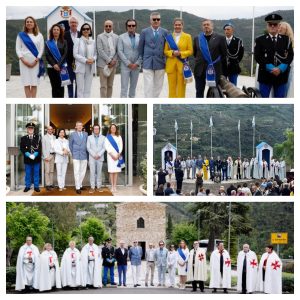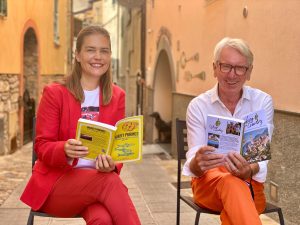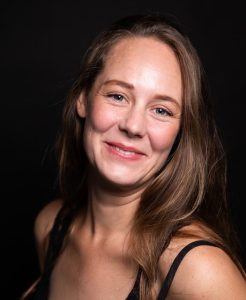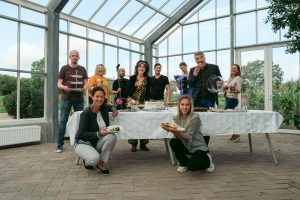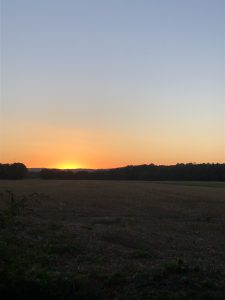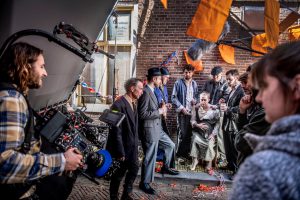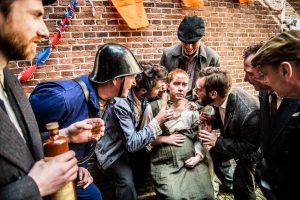Our first couple for our blog: Alexa & Joao from SHORTCUTZ!!!
31 May 2023Alexa Rodrigues was an actress in the theatre and on TV in Portugal. She is also a Geo-Resources Engineer with a post-bachelor as a business analyst. She worked for the third-largest bank in Portugal, BPI, for eight years. One day she decided to quit corporate life and started working as a producer for one of the largest NGOs in Portugal: Chapitô. This is an organization that helps with the reintegration of young delinquents into society through circus arts.
One night a friend took her to ‘Polvo’, Lisbon’s first network for filmmakers and shortly after, she started to help the organization with the production of events. At Polvo, she met Rui de Brito, the founder of the Shortcutz concept. In addition, Alexa produced several short films and music videos with Portuguese filmmakers.
Over the past years, Alexa has used all her experience and knowledge to build Shortcutz Amsterdam from scratch. She also hosts the weekly Sessionz and co-hosts for the Annual Awards. Alexa is the co-founder and executive producer of Shortcutz Amsterdam.
João Rodrigues is a dedicated professional with a strong background in film direction, cinematography, and editing. Driven by his unwavering passion for filmmaking, he decided to pursue his studies in camera and editing instead of completing his Civil Engineering degree.
Over the past 12 years, he has had the privilege of working on various projects, including music videos, short films, feature films, animation series, and corporate films. João has been fortunate to receive recognition and several awards for his camera work and editing skills. In addition, he has had the honor of being invited as a guest teacher at the New York Film Academy in Amsterdam and Mumbai, where he has shared his knowledge and expertise with aspiring filmmakers.
João serves as the co-founder and creative director of Shortcutz Amsterdam, a platform dedicated to fostering creativity within the film industry.
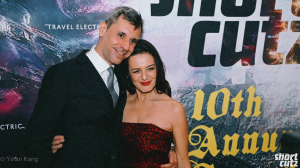
You are the initiators and owners of Shortcutz Amsterdam but you are both Portuguese. How did that come about?
It was during the crisis in Portugal and all the projects we were working on stopped. We were considering what the future would look like. And then my best friend was living in Amsterdam for a few years and invited me to come to Amsterdam and check it out for one week. I loved it when I was here and I told Joao that I would love to live here. Everything went really fast and we got really lucky that we were able to rent a house really quickly.
We wanted to establish Shortcutz as a side project while we work on other things. But the project took off really fast and we gathered a lot of exciting people. In the beginning everybody was telling us that there were not many platforms with Q&A’s for the new Dutch filmmakers, it was only at the respected festivals. We had a lot of people saying it wouldn’t work, but since the beginning the sessions were taking off, everybody was really interested. I think it is also because the Amsterdam spirit is ‘culture curious’ and everybody wants to know what is going on with the new Dutch talent. Filmmakers themselves were interested in being part of a small community and I also think it’s the best business card for Dutch cinema. And besides that, Shortcutz is really accessible. It was important to not make it super intellectual, but make it really fun, informal, entertaining and laid-back, so everybody feels comfortable asking questions. Guests are always surprised by the number of questions they get on the Q&A, which is not common at a lot of festivals. And also important; it is for free. All the Shortcutz cities do it. It’s part of the Shortcutz rules to do exactly this. Shortcutz is like a business card for the new makers of the next-generation.
You are the two most passionate people about Dutch short films. What is your drive?
The mission of Shortcutz is to help the young generation of filmmakers to showcase their film. Our short film festival is for emerging talent and movie lovers that celebrates creativity and community. To give opportunity to help young Dutch filmmakers to reach audiences and put Dutch cinema on the map nationally and internationally.
We want to give opportunities to the filmmakers without film education. Sometimes the road is a bit tricky for them. The good thing about film school is they also give you a lot of networking opportunities. So when you are studying, you already are developing contacts with screenwriters and directors. The problem is when you don’t have any of this and you are just doing movies with your friends because you love the cinema. And those people need a push.
And I like that our festival ended up being a good platform for them as well, like a representative platform. And we have seen filmmakers succeed and that’s the most rewarding part of Shortcutz. One of our winners, a director, wrote their first Netflix series and now has one very successful film around the country in the cinemas and they were selected to IFFR. So all these things makes it all worth while.
How do you believe a weekly film festival focused on Dutch short films contributes to the local film industry and its creators?
It is a great networking opportunity. For example, in one of the last sessions we had Blender, a 3D software used for animations, and one short animation made with Blender and those people connected. For the next film, the director and Blender are probably going to collaborate. Opportunities arise during the sessions. I remember once that there was a guest promoting a film and in the audience was Christopher Mack from Netflix. He just wanted to watch a few films that night, he just showed up and they connected and magic happened.
Shortcutz is a hangout spot. It happens every week. If you have nothing to do on a Tuesday, maybe you can come for a drink and you end up having well-known actors or producers in the audience.
What kind of changes would you make in the short film industry to give new talent a better chance?
Maybe fewer rules. Less opinions on their scripts, especially when they are starting out. I believe that when you are putting one million euros in a film, it’s different. But if you are a filmmaker and you are just asking for a bit of money to do a short film, you are boiling with new ideas. Too many opinions or forcing them to do things when they are onlyexperimenting will not make them better directors in the long term.
Instead, I think it’s good to coach the people, but they will make mistakes. So let them. The more mistakes they will make, the faster they will learn. And they also could bring something that you have never seen before. And if you are putting them down you will never have a chance to see that.
Especially when they’re trying to get a budget. Normally the funds give opinions on the scripts here in the Netherlands. And I think they should not do it when the directors are starting. Leave them alone a little bit in the beginning and then when they flop and fail, then you can coach and guide them.
What kind of advice would you give upcoming filmmakers?
So the first piece of advice is to accept that the life of a filmmaker is a life full of ‘no’s’. You will hear No all the time. It doesn’t matter at which point you are in your career. In the beginning, you will hear no from funds because they’ve never heard about you. Learning to have thick skin will help you.
Also, do something! Don’t stop fueling your creativity. The more you train your creativity, the better it will become. Like Kubrick says, it doesn’t matter if you study or not study. Deep down, in the end, what matters is who is kissed by the muse. Who has the idea? So a filmmaker’s life is searching for that. Then, of course, you need the knowledge to put it through or surround yourself with people with the knowledge to put it through. But the goal is to be kissed by the muse.
And then writer Milou Rohde’s chain question: What do you think the short films by Dutch makers say about the Netherlands?
I see a lot of films with dry humor and there’s also a very big trend of surrealism. And I think that totally relates to Dutchculture. Sometimes you see the most disarming thing with the most serious face, and it’s so funny. I don’t think the Portuguese can pull this off like the Dutch. And also, surrealism goes so well with the country because of this, too. I think those are the things that the Dutch can bring to the table really well. The desiring honesty, which is something super Dutch.
Shortcutz can ask the chain question for next month’s New Talent filmmaker; Lisa Ruseler. Lisa Ruseler’s bio mentions her background in video, photography, and other art forms.
In 20 years what would she like to hear other people say about her work?
